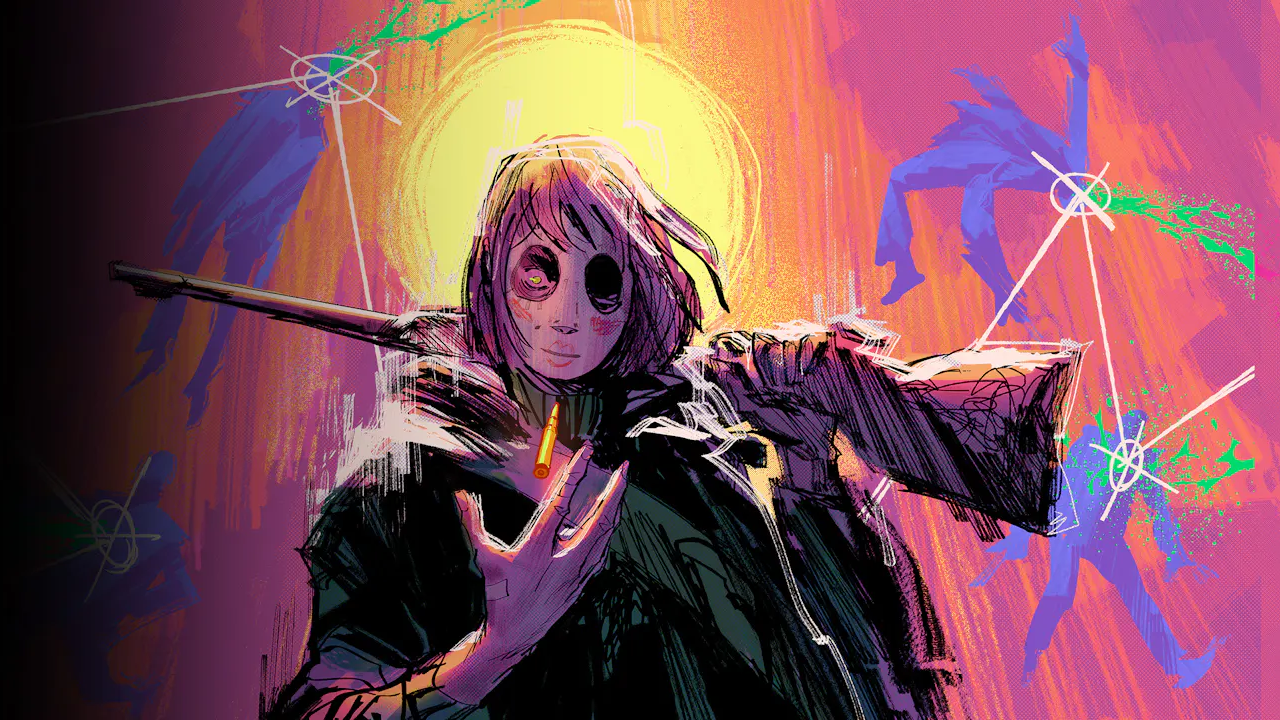Kill whole camps of cultists with a single bullet in this psychic and psychedelic puzzle shooter
Children of the Sun is a mind-bending combo of action movie flash and backwoods madness.

The problem with the phrase "it's like [thing] on acid!" becoming such a lame cliché is that sometimes things really are like other things on acid. The newly announced Children of the Sun, from publisher Devolver, is a dark and hallucinatory tale of a disturbed sniper taking revenge on a backwoods cult, and… well, basically it's like playing Superhot while having a bad trip.
Each level starts with you on the outskirts of a gathering of the cult—whether one of its camps, a village it's ransacking, a crime scene it's covering up, or worse. You can move around the edges of the scene, essentially on a track, and survey it with your rifle scope to tag enemies and important objects. Once you've got a strategy figured out, you aim and fire—and you have to clear the entire level of enemies with that one bullet.
This is where having disturbing psychokinetic powers comes in handy. Whenever the bullet hits a person (in a shower of murky gore), or a car's fuel cap (causing a crackling explosion of chunky pixels), time slows to a crawl and you're able to choose a new trajectory for the bullet. As it flies to its next target, you can even curve it a little bit to get round obstacles. The result is a sort of grim join-the-dots puzzle, as you find the perfect path between targets that prevents your bullet ever being stuck somewhere where it's blocked from redirecting into another skull.
Like Superhot, it feels like directing little action movie sequences step by step, perfectly orchestrating your character's revenge spree. At the end of each level, you're rewarded with a satisfying top-down view of your bullet's path—it goes without saying that the more elaborate the zig-zagging route, the more pleasing it is to see on the results screen.
All of this psychic bloodshed is elevated by brilliantly queasy, grimy visuals. The story is told minimally and without dialogue—brief, jerky cutscenes and flashbacks rendered as jagged 2D animations—but just the look of each scene conveys what's going on inside the reclusive protagonist's head. Landscapes are grainy and distorted; against these muted backdrops, the yellow ponchos of the cult members blaze as painfully bright as the lanterns and campfires they gather around. Buildings have an eerie pink glow that seems to rise off them like steam, and objects float impossibly off the ground—hallucinations, or stray psychic phenomena?

It's the world as she sees it, not as it is, and that gets you subtly questioning how reliable her point-of-view on her bloody mission even is. On the level select screen, her masked face jerkily follows the movements of your mouse. She feels like a puppet with half its strings cut, and it's really genuinely unsettling directing her along her hyperviolent path.
Without that wonderfully thick atmosphere, the actual puzzling would probably start to get a little thin. I enjoy how open the systems are to creative thinking—it was very cool, for example, to discover that you can still tag enemies as a flying bullet, allowing a failed run to be its own opportunity to scout out foes not visible from the outskirts. But it's hard to shake the feeling that all it's really doing is making very simple puzzles more difficult by limiting your viewpoint on them—I often find myself wishing I could just see a scene from a slightly higher vantage point, rather than having to peer around trees trying to find one last arbitrarily hidden untagged target.
Keep up to date with the most important stories and the best deals, as picked by the PC Gamer team.
It's very possible, however, that more depth is revealed further on than I've been able to play, and even if not it's a game so dripping with style that you can't be too put out if its formula isn't quite watertight. It's the kind of game you really need to see in motion, not just in screenshots. Convenient, then, that there's a demo available now on Steam.

Formerly the editor of PC Gamer magazine (and the dearly departed GamesMaster), Robin combines years of experience in games journalism with a lifelong love of PC gaming. First hypnotised by the light of the monitor as he muddled through Simon the Sorcerer on his uncle’s machine, he’s been a devotee ever since, devouring any RPG or strategy game to stumble into his path. Now he's channelling that devotion into filling this lovely website with features, news, reviews, and all of his hottest takes.

